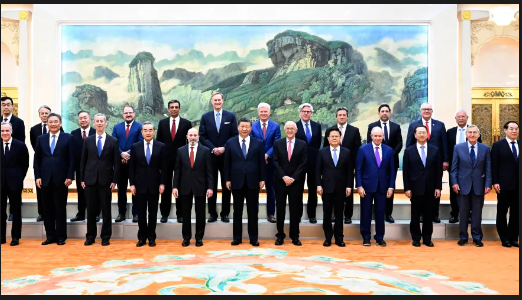Bridging Economies:- ties and promote foreign investment, Chinese President Xi Jinping recently met with a delegation of U.S. business executives. This high-profile engagement underscores China’s ongoing efforts to attract foreign capital and foster collaboration with American companies despite geopolitical tensions. This article aims to provide a comprehensive analysis of Xi’s meeting with U.S. business leaders, the potential impact on bilateral relations, and the broader implications for global economic dynamics.
Context of China-U.S. Economic Relations Bridging Economies:
Bridging Economies:The economic relationship between China and the United States has been characterized by both cooperation and competition. Over the past few decades, China has emerged as a key player in the global economy, fueling growth through its manufacturing prowess, export-oriented model, and vast consumer market.  for more information click on this link
for more information click on this link
Despite periodic friction over trade imbalances, intellectual property rights, and market access, China and the U.S. have maintained extensive economic ties, with American companies heavily invested in China’s market and supply chains. However, escalating geopolitical tensions, particularly in realm of technology and security, have strained bilateral economic relations in recent years.
Xi Jinping’s Engagement with U.S. Business Executives
Against this backdrop of geopolitical complexity Bridging Economies:, Xi Jinping’s meeting with U.S. business executives sends a signal of China’s willingness to engage constructively with American companies and address their concerns. The gathering, which included representatives from various sectors such as technology, finance, manufacturing, and energy, provided an opportunity for dialogue and cooperation on mutual interests and challenges.
During the meeting, Xi emphasized China’s commitment to further opening up its economy, enhancing market access, and creating a level playing field for foreign businesses. He highlighted China’s ongoing economic reforms, including measures to strengthen intellectual property protection, streamline regulatory processes, and promote innovation-driven growth.
Bridging Economies:Xi’s outreach to U.S. business leaders also served as a platform to showcase China’s attractiveness as an investment destination, citing its resilient economy, growing middle class, and ample opportunities for collaboration across industries. The Chinese president reiterated China’s commitment to upholding multilateralism, fostering free trade, and contributing to global economic recovery and development.
Potential Impact on Bilateral Relations
Bridging Economies:Xi Jinping’s engagement with U.S. business executives could have significant implications for bilateral relations between the two countries. By demonstrating a willingness to address concerns raised by American companies and promote a more open and transparent business environment, China seeks to mitigate tensions and build trust with its largest trading partner.
At the same time, the meeting reflects China’s recognition of the importance of foreign investment in driving economic growth and innovation. By actively courting U.S. businesses, China aims to leverage their expertise, technology, and capital to advance its own development agenda and bolster its position as a global economic powerhouse.
However, the success of Xi’s outreach efforts hinges on several factors, including the implementation of promised reforms, the resolution of longstanding trade and investment disputes, and the broader geopolitical dynamics shaping China-U.S. relations. Persistent concerns over market access, intellectual property rights, and regulatory transparency could continue to pose challenges to deeper economic engagement between the two countries.
Broader Implications for Global Economic Dynamics
Xi Jinping’s meeting with U.S. business executives carries broader implications for global economic dynamics, particularly amidst growing calls for decoupling and reshoring in the wake of the COVID-19 pandemic and geopolitical tensions. As China seeks to attract foreign investment and expand its influence in the global economy, its engagement with American companies signals a willingness to adapt to changing realities and navigate complex geopolitical terrain.
The outcome of China-U.S. Bridging Economies: economic relations will not only shape the trajectory of bilateral trade and investment but also reverberate across global supply chains, financial markets, and innovation ecosystems. As the world’s two largest economies, China and the U.S. have a vested interest in promoting stability, predictability, and cooperation in the realm of trade and investment.
Conclusion
Bridging Economies:Xi Jinping’s meeting with U.S. business executives represents a significant diplomatic overture aimed at fostering economic cooperation and building bridges amidst geopolitical tensions. By engaging with American companies and addressing their concerns, China seeks to promote a more open and inclusive economic environment while positioning itself as an attractive destination for foreign investment.
The success of China’s outreach efforts will depend on the extent to which it can address structural barriers to market access, protect intellectual property rights, and promote a level playing field for foreign businesses. As China and the U.S. navigate the complexities of their economic relationship, the outcomes will have far-reaching implications for global economic dynamics and the future of international trade and investment. check the post




